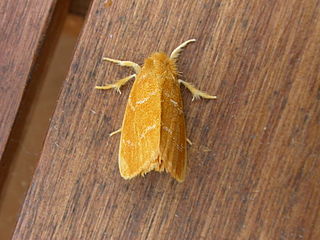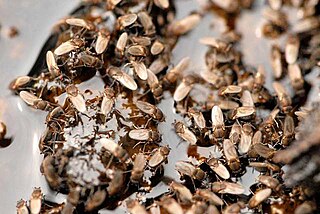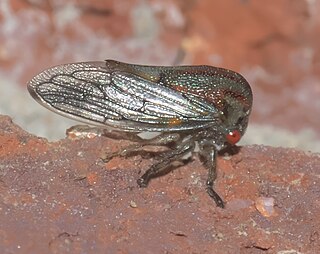
Convolvulaceae, commonly called the bindweeds or morning glories, is a family of about 60 genera and more than 1,650 species. These species are primarily herbaceous vines, but also include trees, shrubs and herbs. The tubers of several species are edible, the best known of which is the sweet potato.

Luffa is a genus of tropical and subtropical vines in the pumpkin, squash and gourd family (Cucurbitaceae).

Tanguar Haor is a wetland ecosystem located in the Dharmapasha and Tahirpur upazilas of Sunamganj District in Bangladesh. The area of Tanguar Haor including 46 villages within the haor is about 100 square kilometres (39 sq mi) of which 2,802.36 ha2 is wetland. It is the source of livelihood for more than 40,000 people. Bangladesh declared it an Ecologically Critical Area in 1999 considering its critical condition as a result of overexploitation of its natural resources.

Barringtonia acutangula is a species of Barringtonia native to coastal wetlands in southern Asia and northern Australasia, from Afghanistan east to the Philippines, Queensland and the Northern Territory. Common names include freshwater mangrove, itchytree and mango-pine.

Dombeya acutangula, the bois bete or mahot tantan, is a species of flowering plant in the family Malvaceae. It is native to the Mascarene Islands, and Madagascar, Malawi, Mozambique, Tanzania, and Zambia.

Dombeya is a flowering plant genus. Traditionally included in the family Sterculiaceae, it is included in the expanded Malvaceae in the APG and most subsequent systematics. These plants are known by a number of vernacular names which sometimes, misleadingly, allude to the superficial similarity of flowering Dombeya to pears or hydrangeas. Therefore, the genus as a whole is often simply called dombeyas. The generic name commemorates Joseph Dombey (1742–1794), a French botanist and explorer in South America, involved in the notorious "Dombey affair", embroiling scientists and governments of France, Spain, and Britain for more than two years.
Tristiropsis acutangula is a tree species of the genus Tristiropsis in the family Sapindaceae. It grows naturally in the Malesian biogeographical region and in northern Australia.

Epipsestis is a genus of moths belonging to the subfamily Thyatirinae of the Drepanidae. It was erected by Shōnen Matsumura in 1921.

Euproctis lutea, the fresh-water mangrove itchy caterpillar, is a species of moth of the family Erebidae. It is found in northern Australia and New Guinea.
Eupithecia acutangula is a moth of the family Geometridae first described by George Hampson in 1895. It is found in Pakistan and India.
Pilocrocis acutangula is a species of moth in the family Crambidae. It was described by George Hampson in 1899. It is found on Borneo.

The Keep River is a river located in the Victoria Bonaparte bioregion of Western Australia and the Northern Territory in Australia.

Coproica is a genus of flies belonging to the family Lesser Dung flies.

Zaitzevia is a genus of riffle beetles in the family Elmidae. There are about 19 described species in Zaitzevia. The genus is named after the Russian entomologist Filipp Zaitsev.

Coproica ferruginata is a species of lesser dung fly in the family Sphaeroceridae. It is found in Europe.
Paectes acutangula is a species of moth in the family Euteliidae. It is found in North America.

Madhupur National Park is a major and one of the earliest national park in Bangladesh.

Platycotis is a genus of treehoppers in the family Membracidae. There are about 13 described species in Platycotis.

The Christmas and Cocos Islands tropical forests ecoregion covers forested areas of Christmas Island and North Keeling Island, two small seamount islands south of the Indonesian island of Java. The forests of these two islands share tree species of the Indo-Pacific and Melanesian types on nearby islands, the forests of Christmas Island and North Keeling Island are unique in how they reflect the effects of large populations of terrestrial red crabs. Because of the remoteness of the islands, there are many endemic species.
Quercus acutangula is a species of oak native to Guerrero, Mexico. It usually grows in either the desert or the dry shrubland biome. It was first published in Repert. Spec. Nov. Regni Veg. 33: 318 in 1934 by William Trelease.













